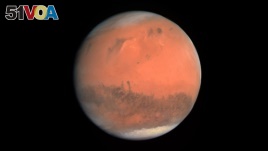26 July, 2018
A huge lake of salty water appears to be buried deep in Mars, scientists reported this week. The presence of water raises the chances of finding life on the red planet.
The discovery is based on observations by a European spacecraft. It has excited experts. Water is necessary for life, and scientists have long hoped to prove that it is present on Mars.
Cassie Stuurman is a geophysicist at the University of Texas. In 2016, she found evidence of a huge ice deposit on Mars.

A study published Wednesday in the journal Science suggests a huge lake of salty water appears to be buried deep in Mars, raising the possibility of finding life on the red planet.
"If these researchers are right, this is the first time we've found evidence of a large water body on Mars," Stuurman said.
Scott Hubbard, a professor of astronautics at Stanford University, is also excited about the discovery. He served as NASA's first Mars program director in 2000. He said NASA has long believed in "following the water." He is pleased that the new discovery supports that idea.
The study was published in the journal Science. Researchers are not yet sure how deep the area of water is. So, they cannot say whether it is an underground pool, an aquifer-like body, or just an area of soft, wet soil.
To find the water, Italian researchers examined radar signals. The signals were collected over three years by the European Space Agency's Mars Express spacecraft. The results suggest that a 20-kilometer-wide water body lies below ice that is 1.5 kilometers thick. They believe the area is close to the planet's southern pole.
Researchers spent at least two years examining the data to make sure they had found water – and not ice or another substance.
"I really have no other explanation," said astrophysicist Roberto Orosei of Italy's National Institute of Astrophysics in Bologna. He is lead writer of the study.
Mars is very cold, but salt in the water may have kept it from freezing. It is the same as when you put salt on a road to prevent ice from forming, said Kirsten Siebach. She is a planetary geologist at Rice University. She was not part of the study.
"This water would be extremely cold, right at the point where it's about to freeze. And it would be salty."
Siebach added that such conditions are not ideal for life to form. But, she said, there are bacteria on Earth that have been able to survive in similar conditions.
Roberto Orosei said it is easy to think that the water body is the first place where life could exist on Mars. But he believes the planet may have other hidden bodies of water, waiting to be discovered.
Mars has been a popular planet for exploration, with some groups placing instruments on its surface and others examining it from space. In May, NASA launched another spacecraft, the InSight Mars lander. It will dig under the surface after it reaches a flat area of the planet in November.
I'm Lucija Millonig.
Emilio Rodriguez Mega reported this story for the Associated Press. Alice Bryant adapted it for Learning Engish. Ashley Thompson was the editor.
_____________________________________________________________
Words in This Story
spacecraft – n. a vehicle that is used for travel in outer space
geophysicist – n. a scientist whose study deals with the physical movements and forces of the Earth
deposit – n. an amount of something (such as sand, snow, or mud) that has formed or been left on a surface or area over a period of time
astronautics – n. the science and technology of human space travel and exploration
pool – n. a small area of water
aquifer – n. a layer of rock or sand that can absorb and hold water
pole – n. either end of the imaginary line around which something, such as a planet, turns
geologist – n. a scientist who studies rocks, layers of soil, et cetera, in order to learn about the history of the Earth and its life
ideal – adj. exactly right for a particular purpose, situation, or person